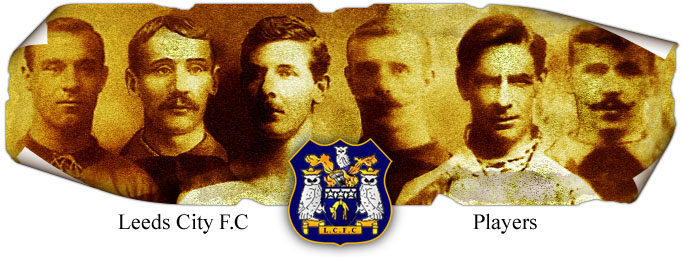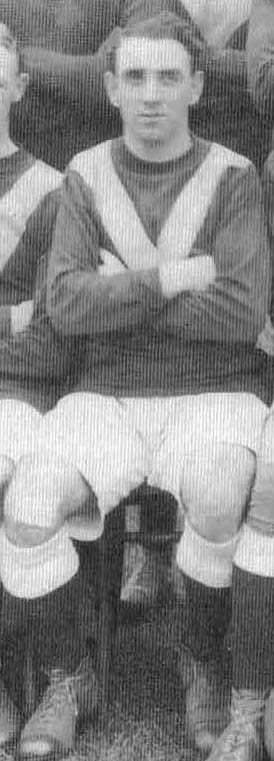

Jackson: John
1913-1915 (Leeds City Player Details)
Inside Forward
Born: Irvine, North Ayrshire: 05-09-1885
Debut: v Birmingham (a): 20-12-1913
5’6 1/2” 10st 2lb (1913)
The Irvine born North Ayrshire native started his football career with Irvine Victora, two years before joining
Ardeer Thistle, who were located in the nearby local town of Stevenston, at the age of 17 at the begining of the
1907-08 season. He was part of the Thistle team, at inside right, that won the Irvine & District Cup for the third
time in 1908-09. The Thistle team was Docherty: Robb and Cook: McCulloch, Reid and Young: Marshall, Jackson,
Allerdyce, Brown and Auld. Celtic sources say that he had a trial period with them in January 1909 but he did not
make a League or competitive appearance for the Hoops in that time. On 16th July 1909 he joined Irvine Meadow
XI. It was said the Hibs had also shown interest but as he belonged to the Irvine District he chose to remain within
its confines and completed a Meadow's team for the coming season, that on "paper form" was one of the best in
the shire. However, it was not to be, as on 27th August 1909, he moved to Clyde of the Scottish League. The
Scottish Referee of Monday, 30th August 1909 reported "The signature of Jackson, Irvine Meadow's inside-right,
was secured by Clyde on Friday Evening. Jackson is a clever player and a smart dribbler and should do well in
senior ranks". He soon broke into the Clyde first team and scored four goals in seventeen League appearances
in the 1909-10 season and enhanced his reputation when he played in the 1910 Scottish Cup Final against Dundee,
which went to two replays after the initial meeting had finished 2-2. The the first replay was goalless, after extra-time,
before Dundee triumphed with a 2-1 win with all three games having Ibrox Park as the venue. Jackson put so much
into the first replay that he collapsed during extra-time. The first of the three games in the finals was especially
disappointing. For eighty-three minutes Clyde held a 2-0 lead with goals from Chalmers and Booth, and looked
certain to win. With the Cup in sight, nerves got the better of Clyde and Robertson miscued a clearance off Blair
and into his own net. Dogged Dundee fought all the way and salvaged the game in the last minute with an equaliser
from Langlands. The replay was far a more cagey affair and ended goalless after extra time but with Dundee looking
physically stronger. The third game was again a tight affair with Clyde scoring after only three minutes through
Chalmers. Dundee equalised before the interval and with Clyde's energy sapped, John "Sailor" Hunter blasted
Dundee to victory. He remained with the "Bully Wee" scoring once in twenty-two games in 1910-11, as they
established themselves as one of the top teams in Scotland and again reached the Final of the Scottish Cup in
1911-12 only to be defeated by Celtic at Ibrox Park, in a season when he scored seven goals in thirty appearances,
following that up with two goals in twenty-seven games in 1912-13. On 30th October 1912, according to Celtic
sources, he rejoined Celtic on loan, but once more failed to register a League appearance. He returned to
Shawfield Park at the start of the 1913-14 season and proceeded to score twice in fifteen appearances before
joining Leeds United for £1,000 in December 1913, and he left Clyde, where to that point he had scored sixteen
League goals in one hundred and eleven appearances. He was an outstanding player at Leeds where he stayed
until the war saw the Football League cease the fixtures at the end of the 1914-15 season. He did not quite live up
to his large transfer fee but one of his best games came in the 4-2 F.A. Cup First Round victory over Gainsborough
Trinity, when he scored twice. He scored ten goals in fifty-four League games and another two in four F.A. Cup-ties.
He went on loan to Ayr United in December 1915, where he scored twelve goals in nineteen League games and
was then loaned to Clyde at the start of the 1916-17 season and he added four goals in twenty-five League
games to take his tally with the club to twenty goals in one hundred and thirty-six League appearances. He then
joined Rangers, on loan, in May 1917, but never played for the first team. His next move was a third spell with
Celtic which started in September 1917. According to Celtic sources, he made his Celtic debut in a 3-0 home
Glasgow Cup defeat to Rangers on 22nd September 1917. During the War he was reported to have run from
Waverley Station in Edinburgh to the Hibernian’s ground in Easter Road to play in a game for Celtic because
he could not catch a taxi. With the ability and enthusiasm to play in most outfield position he proved to be a useful
signing for the Hoops. He scored three goals in twenty-one League games in 1917-18 and one goal in six League
games in 1918-19, a total of twenty-seven games and four goals, before leaving in May 1918 to serve with the
Royal Scots Fusiliers. He joined Clydebank on loan in January 1919, and scored seven goals in eleven League
games before joining Motherwell in October 1919. He failed to find the net in six League games for the Fir Park
team and left for Dundee in December 1919. He scored once in twenty League starts for the Dens Park team in
the 1919-20 season and went on loan to Stevenston United in 1920. He returned to Dens Park for the 1920-21
season and scored once in thirty-seven League appearances. He played his final season with Dundee in
1921-22, playing twenty League games without scoring to take his tally at Dens Park to two goals in seventy-
seven appearances. He played one representative game for the Scottish League, when he appeared at Inside
Right for the League against the Irish League at Cliftonville's Solitude Ground in North Belfast on 6th November
1912. He played a full game at inside right in a 3-1 win, in front of 10,000 according to The Daily Express in its
Match Report on the following day. The Courier of Dundee also carried the same details although they estimated
the crowd at 8,000. While, in Belfast, The Newsletter was equally verbose, confirming that it was played at
Cliftonville and, while not having a guess at the crowd, informed everyone that the weather was dull, but fine with
little or no wind, and that Mr Harry Pollett of Manchester had the whistle and at Inside Right Mr Jackson was
currently playing for Clyde. Cliftonville FC is the Oldest club in Northern Ireland, originally an Amateur one, and
Solitude is the oldest Ground, but at the time of the game with the Scottish League it was relatively new and
games for the club were in their infancy after moving from the Cricket ground across the road. The club had
hosted most of the representative games from the 1890s through the 1900s. For the record Windsor Park,
home of Linfied is in South Belfast and was not opened until 1905. That game was the pinnacle of his career.
However, he also did have several other games of a representative type. Most importantly, he was travelling
reserve with Scotland for the international in Belfast on 19th March 1910 which resulted in a 1-0 win for the Irish.
He also played in Scottish international trials, one being for the Scots against the Anglo-Scots on 21st October
1910. He also represented Glasgow on two occasions in the annual fixture with the Sheffield FA. Those games
were on 16th October 1911 at Cathkin Park, home of Third Lanark, and 21st October 1912 at Bramall Lane,
home of Sheffield United. (Thanks to Neil Roche for the representative details and many other questions of
facts and to George McGrattan in establishing the facts of his early life and career. Thanks also to Joe Bloggs
of Celtic Wiki for items of Celtic sources). It is hoped that his precise date of birth and details of his death may
soon be established. Now with many thanks once again to George McGrattan, Website Author of Ardrossan
Football Club ,the facts of his birth have now been established.
But it seems that John Jackson was not aware of his age or he sought to lower it. So his date and place of death
remain unknown at present, but if it comes to hand I will acknowledge the source (as I have done with George)
but for now, his fantastic contribution can be seen here -
(George McGrattan JJ1)
(George McGrattan JJ2)